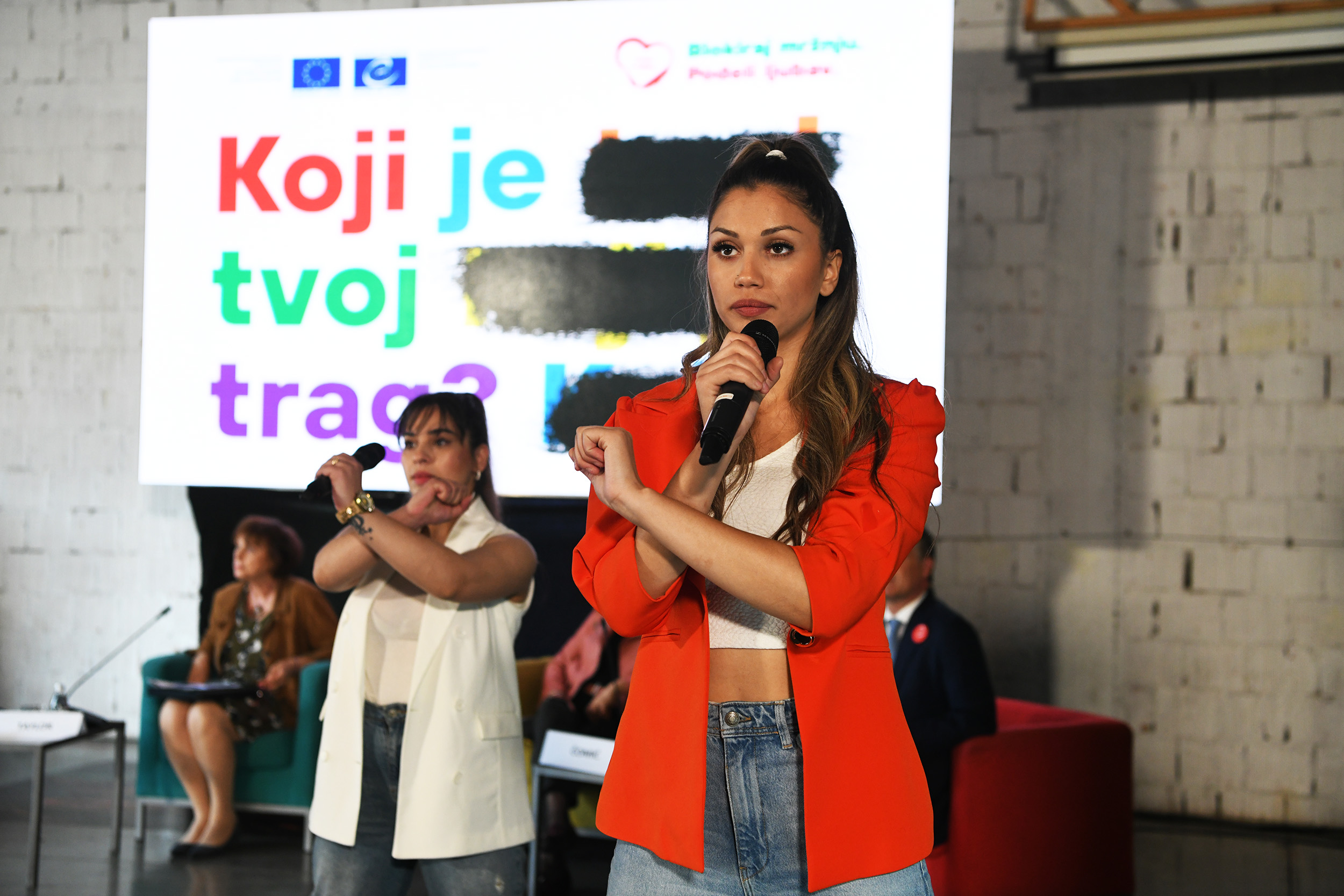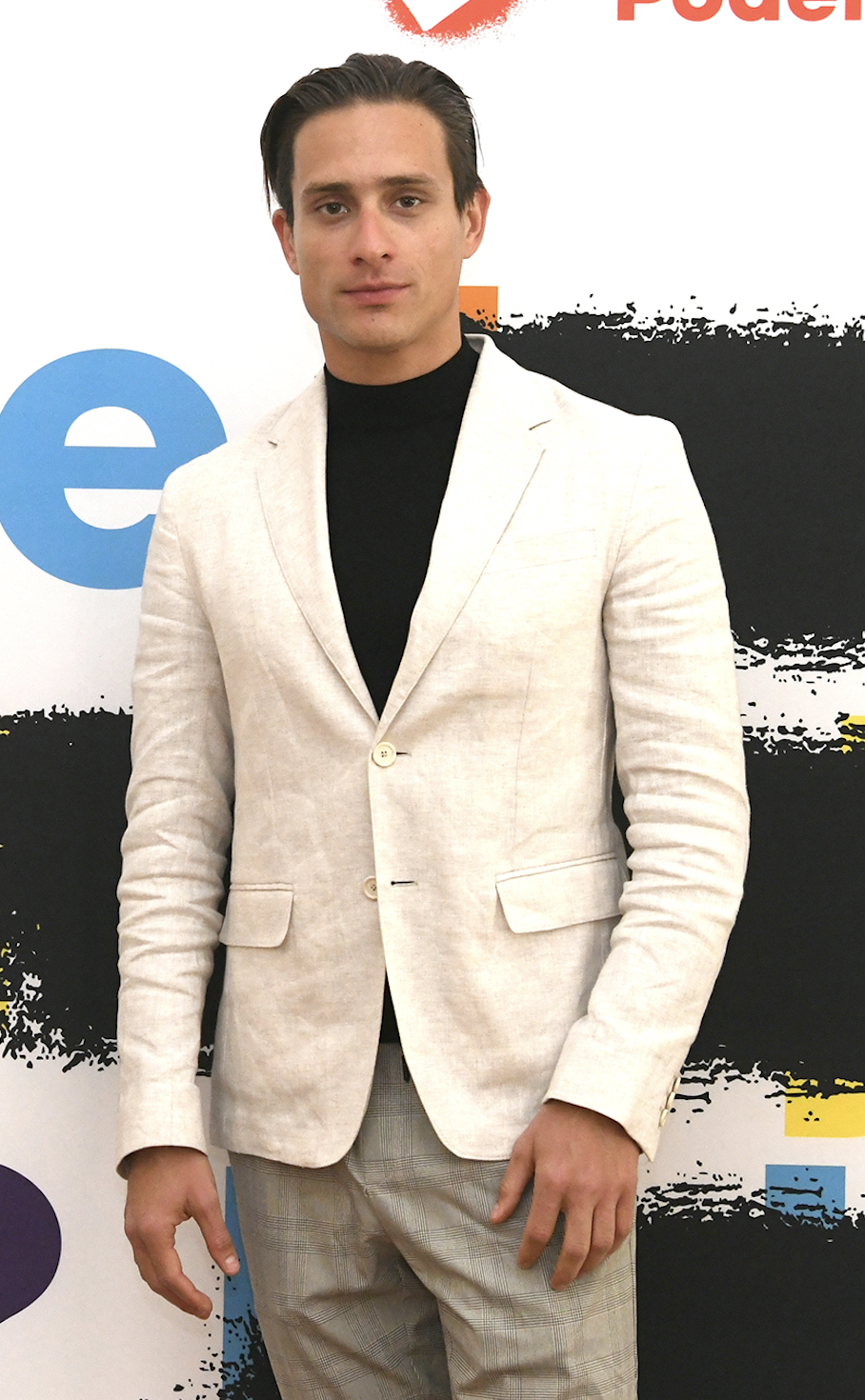
“Block the hatred. Share the love” is the slogan of a new European Union/Council of Europe (CoE) initiative which aims at combating hate speech, including the increasing volume of negative online content, especially social media. Acknowledging that it will be an uphill battle to draw a line between freedom of expression and hate speech, to regulate what is suitable and where filters are needed, the campaign aims to educate social media users to pay attention what they post on their own pages or on other public platforms.
The initiative aims to tackle various forms of hate speech targeting certain communities and vulnerable social groups. In Serbia, as much as elsewhere in the Western Balkans, the campaign has involved public figures who act and speak as ambassadors of change. People who are famous for their achievements in arts, acting, sports and other fields are encouraging their audiences and followers to discuss – and adopt – positive behaviour in diverse societies, seek to change stereotypes and promote equality. The campaign leaders believe that this can initiate the much-needed change in the public opinion and reduce problematic language online.
“We are calling on people to think twice before posting something online: be aware that toxic narratives can spread fast, but their effects can be irreparable, as they can fuel hate and even incite violence against an individual or a group, no matter what your initial intention was.”
Ninoslav Mladenović, Council of Europe
Ninoslav Mladenović from the CoE’s anti-discrimination department is a member of the team working on the project “Promotion of Diversity and Equality in the Western Balkans”. He explains that it is important to get this message across to people who are not aware of the damage they are causing, perhaps inadvertently, and make them aware of how others might feel about their statements. “We are calling on people to think twice before posting something online: be aware that toxic narratives can spread fast, but their effects can be irreparable, as they can fuel hate and even incite violence against an individual or a group, no matter what your initial intention was.”
Thinking about the online trace
The CoE regional campaign has been given an extra dimension in Serbia where online media users were asked a tagline question: “What trace do you leave online?”. This has triggered users to think before they publish anything, reminding them that content is there to stay and won’t disappear instantly, irrespective of whether it incites violence or shares empathy.

“It is important that we have the power to use our public space to promote empathy, understanding and mutual respect, because that is what we undoubtedly lack in society.”
Slaven Došlo, actor
One of the most prominent figures in the world of acting, Slaven Došlo, joined the national campaign as an ambassador to spread the message of inclusiveness. “It is important that we have the power to use our public space to promote empathy, understanding and mutual respect, because that is what we undoubtedly lack in society,” Došlo said in a media interview as part of the campaign. The famous actor has taken acting roles that address issues he believes must be tackled, such as human rights abuses and inequality. When Slaven Doslo played a character from the LGBTI community he received a wave of criticism and even hate messages from internet users who associated the actor with his character.
This kind of hate speech comes to no surprise to the organisers of the “Block the hatred. Share the love” campaign. According to a study published by Centre for Free Elections and Democracy, a CoE’s programme grantee this year, fewer than 20% of citizens in Serbia have a positive attitude towards the LGBTI community, with 50% of respondents having a negative attitude. One of the recommendations of the study is to develop a strategy of involving users of online media and social networks who are under 40 to influence other members of the society.
This recommendation is already being implemented in the campaign through the involvement of a specific kind of influencers – the ‘no-hate’ Young European Ambassadors (YEAs). Their network promotes the activism of young people within their local communities as a powerful force of social change. YEAs have participated in pride marches, movie screenings, discussions on same-sex partnerships, and ways to improve the position of LGBTI people who are among the most discriminated groups in the society. Around 25 youth European Ambassadors, members of the network have been trained by the Council of Europe team, to enhance their awareness on hate speech and skills in developing human rights narratives when talking in public and behaving in social media.
However, it takes a multipronged action to change perceptions and behaviour towards the LGBTI community. Mladenović explains that they started their work in May, ahead of the Europe Day, and have continued with school visits to raise awareness about the damage that hate speech can cause to the society.
In addition to awareness-raising activities, the CoE works with partners to bring about structural and systematic changes in the system. One example is working with local institutions to strengthen their capacities for mainstreaming LGBTI rights in local policy documents and bylaws.
We can’t all make such changes at policy level, but the campaign reminds us that we can all block the hatred – and share the love.
About the programme
This programme supports key local actors and beneficiary institutions in Serbia and elsewhere in the Western Balkans in the fight against discrimination, hate speech and hate crimes directed against minorities, LGBTI people and other vulnerable groups in the society. It also supports Serbia’s and Western Balkans beneficiaries’ efforts in the context of accession negotiations with the European Union in the field of fundamental rights. The programme is financed under the European Union / Council of Europe Horizontal Facility for the Western Balkans and Turkey 2019-2022.
Photo credits: Horizontal Facility for the Western Balkans and Turkey II
The initiative aims to tackle various forms of hate speech targeting certain communities and vulnerable social groups. In Serbia, as much as elsewhere in the Western Balkans, the campaign has involved public figures who act and speak as ambassadors of change. People who are famous for their achievements in arts, acting, sports and other fields are encouraging their audiences and followers to discuss – and adopt – positive behaviour in diverse societies, seek to change stereotypes and promote equality. The campaign leaders believe that this can initiate the much-needed change in the public opinion and reduce problematic language online.
Ninoslav Mladenović, Council of Europe
Ninoslav Mladenović from the CoE’s anti-discrimination department is a member of the team working on the project “Promotion of Diversity and Equality in the Western Balkans”. He explains that it is important to get this message across to people who are not aware of the damage they are causing, perhaps inadvertently, and make them aware of how others might feel about their statements. “We are calling on people to think twice before posting something online: be aware that toxic narratives can spread fast, but their effects can be irreparable, as they can fuel hate and even incite violence against an individual or a group, no matter what your initial intention was.”
Thinking about the online trace
The CoE regional campaign has been given an extra dimension in Serbia where online media users were asked a tagline question: “What trace do you leave online?”. This has triggered users to think before they publish anything, reminding them that content is there to stay and won’t disappear instantly, irrespective of whether it incites violence or shares empathy.

One of the most prominent figures in the world of acting, Slaven Došlo, joined the national campaign as an ambassador to spread the message of inclusiveness. “It is important that we have the power to use our public space to promote empathy, understanding and mutual respect, because that is what we undoubtedly lack in society,” Došlo said in a media interview as part of the campaign. The famous actor has taken acting roles that address issues he believes must be tackled, such as human rights abuses and inequality. When Slaven Doslo played a character from the LGBTI community he received a wave of criticism and even hate messages from internet users who associated the actor with his character.
This kind of hate speech comes to no surprise to the organisers of the “Block the hatred. Share the love” campaign. According to a study published by Centre for Free Elections and Democracy, a CoE’s programme grantee this year, fewer than 20% of citizens in Serbia have a positive attitude towards the LGBTI community, with 50% of respondents having a negative attitude. One of the recommendations of the study is to develop a strategy of involving users of online media and social networks who are under 40 to influence other members of the society.
This recommendation is already being implemented in the campaign through the involvement of a specific kind of influencers – the ‘no-hate’ Young European Ambassadors (YEAs). Their network promotes the activism of young people within their local communities as a powerful force of social change. YEAs have participated in pride marches, movie screenings, discussions on same-sex partnerships, and ways to improve the position of LGBTI people who are among the most discriminated groups in the society. Around 25 youth European Ambassadors, members of the network have been trained by the Council of Europe team, to enhance their awareness on hate speech and skills in developing human rights narratives when talking in public and behaving in social media.
However, it takes a multipronged action to change perceptions and behaviour towards the LGBTI community. Mladenović explains that they started their work in May, ahead of the Europe Day, and have continued with school visits to raise awareness about the damage that hate speech can cause to the society.
In addition to awareness-raising activities, the CoE works with partners to bring about structural and systematic changes in the system. One example is working with local institutions to strengthen their capacities for mainstreaming LGBTI rights in local policy documents and bylaws.
We can’t all make such changes at policy level, but the campaign reminds us that we can all block the hatred – and share the love.
About the programme
This programme supports key local actors and beneficiary institutions in Serbia and elsewhere in the Western Balkans in the fight against discrimination, hate speech and hate crimes directed against minorities, LGBTI people and other vulnerable groups in the society. It also supports Serbia’s and Western Balkans beneficiaries’ efforts in the context of accession negotiations with the European Union in the field of fundamental rights. The programme is financed under the European Union / Council of Europe Horizontal Facility for the Western Balkans and Turkey 2019-2022.
Photo credits: Horizontal Facility for the Western Balkans and Turkey II
Please wait while your video is being uploaded...
Don't close this window!